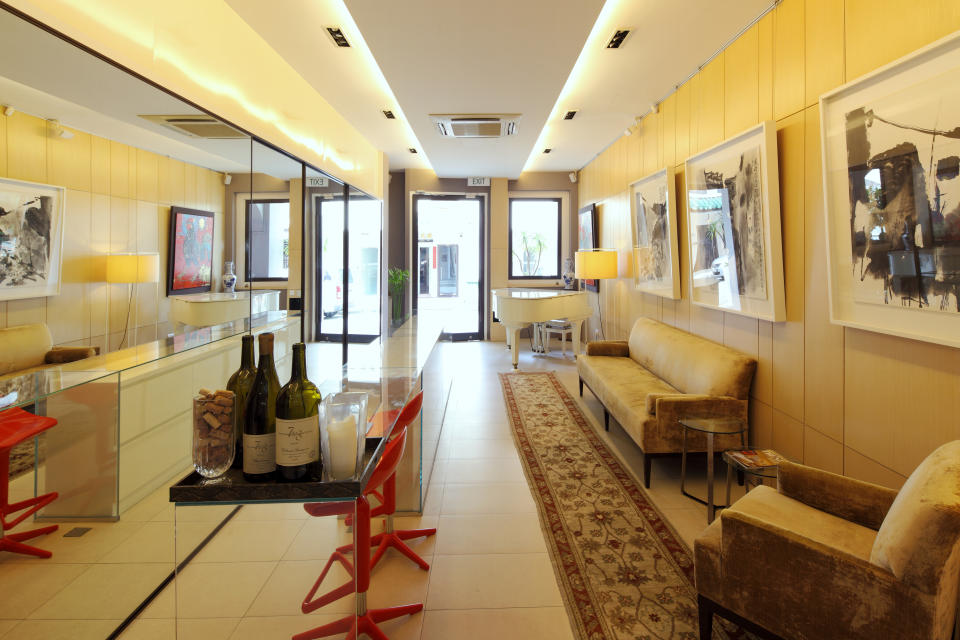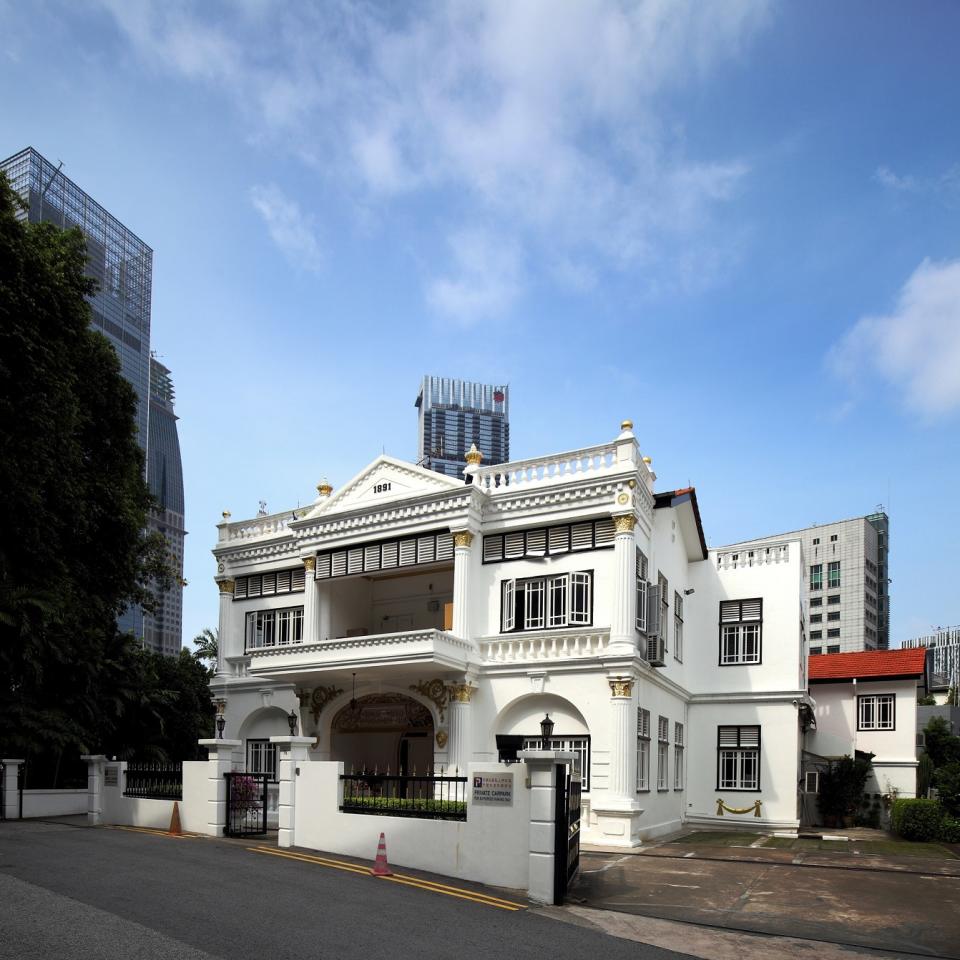63 and 65 Club Street up for sale
For the past six months, Jerry Tan, founder and managing director of JTResi boutique agency, which markets luxury residential property, had been mulling over selling his shophouse at 65 Club Street. It was not an easy decision to make, and the timing has not seemed right until now. “It’s about pride of ownership,” says Tan. “We didn’t even want to rent out our shophouse to anyone.”
Tan had purchased the shophouse at 65 Club Street in May 2006 for $2.8 million. At the launch of Kelvin Tan’s book, On a Little Hill in China town: Singapore’s Ann Siang Hill, hosted by JTResi on Oct 18, he related the anecdote of his purchase: “I had returned from a business trip in Jakarta, and Eckardt Caius [co-founder and executive director of JTResi] had placed a newspaper ad with a picture of a beautiful shophouse on my table. The minute I saw it, I said we had to see it that afternoon. But I said I wouldn’t want to spend more than $1 million. Caius said, ‘Don’t bother. It’s $3 million.’”

JTResi's office and reception-entertainment area on the first level of 65 Club Street (Photo Credit: Samuel Isaac Chua/EdgeProp Singapore)
Still, Tan arranged to view the shophouse on Club Street that afternoon. “I stood here, and it was dark and dingy then,” he recounts. “The shophouse had seven tenants — regional lawyers on the first level who were using it as a home office, as they lived there too; a bridal studio on the second level; and other small offices. But it spoke to me, and we bought the shophouse in 10 minutes.”
JTResi’s Tan spent another $1.2 million refurbishing it before moving in in August 2006. The shophouse was always intended to be more than just an office: It was a sales gallery and a place to entertain clients and friends as well. “We deal with high-end real estate, and we wanted a place where we could come and enjoy art, music, food and drinks,” he says. “This office was designed on the basis of always entertaining. Of course, there is an office area where serious work is going on.”
Club deal
Shortly after deciding on purchasing the shophouse at 65 Club Street, Tan was having drinks with one of his clients and he told her about his purchase. This was before he had exercised the option to purchase.
The client immediately insisted that Tan show her the shophouse that very evening. “That evening, we were standing out there on the street, and she was walking up and down in her stilettos, and studying the area,” says Tan. “Then she rummaged through her handbag, took out her cheque book, wrote out and handed me a cheque for $500,000.” Her intention was to get Tan to assign the option for 65 Club Street to her. When he refused, she told him to hold on to the cheque, as she wanted him to acquire the neighbouring shophouse on her behalf.

63 and 65 Club Street (Photo Credit: Samuel Isaac Chua/EdgeProp SIngapore)
Thus, shortly after exercising the option to purchase 65 Club Street for JTResi, Tan and fellow executive director and co-founder of JTResi, Jason Tan, knocked on the door of the neighbouring unit at 63 Club Street. At the time, it was owned and occupied by architectural firm Raymond Woo & Associates. Woo agreed to sell the shophouse for $3.1 million, but it came with a leaseback agreement, as he wanted to continue occupying the space for a few years.
For more than a decade now, JTResi has also managed the unit at 63 Club Street on the client’s behalf. Now that Tan is putting his property up for sale, his client — the owner of the property at 63 Club Street — has decided to follow suit. Thus, JT Resi is now the marketing agent for both 63 and 65 Club Street, which are available for sale either separately or together.
The land area of 65 Club Street is 2,083 sq ft, with a 999-year lease tenure. The three-storey shophouse has a built-up area of 5,640 sq ft. Meanwhile, the neighbouring unit sits on a slightly smaller land area of 1,938 sq ft, with a built-up area of about 4,900 sq ft.

The second level office where serious work is done at JTResi (Photo Credit: Samuel Isaac Chua/EdgeProp Singapore)
While 65 Club Street has been owner-occupied by JTResi these past 12 years, the neighbouring unit has always been tenanted. After Raymond Woo & Associates moved out, lifestyle store Vanilla Home moved in to occupy the 1,600 sq ft first level three years ago. There are two other tenants on the upper floors. The gross monthly rental rate for the three tenants is said to be $24,965.
Quiet end of Club Street
65 Club Street is located in a cul-de-sac. As such, it is quiet, unlike the main Club Street, which is teeming with bars and restaurants. Across the road from JTResi is 76 Club Street, a millionaires’ club today. It was the first club in the Ann Siang Hill precinct, and it gave Club Street its name. It was originally known as Chwee Lan Tong Club, established by Tan Quee Lan, a prominent merchant and landowner. Its name was changed to the Chinese Weekly Entertainment Club in 1891. Originally located on Ann Siang Hill, the club purchased its own premises at the current location at the end of Club Street, to which it moved in in June 1898, according to the book by Kelvin Tan.
Adjacent to the Chinese Weekly Entertainment Club is the Goh Loo Club, founded more than a century ago by Lim Boon Keng, a writer and businessman after whom a road and an MRT station are named, as well as businessman and philanthropist Lee Kong Chian, who is behind the Lee Foundation, Lee Rubber, OCBC Bank and Great Eastern Life Insurance as well as Sime Darby. Adjacent to the Goh Loo Club is the Tham Si Thung She (Tham Association) at 68 Club Street. The National Union of Gold and Silver Workers is located at 60 Club Street; the Singapore Sugar Traders Association is at 59 Club Street; and the Singapore General Rice Importers Association at 59B Club Street. Many of the other clan associations, clubs and guilds established in the 1920s and 1930s on Ann Siang Hill and Club Street no longer exist. Many of these shophouses have either changed hands or been converted into boutique hotels and offices, with retail and F&B on the first level.

Across the road from JTResi is 76 Club Street, a millionaires’ club today. It was the first club in the Ann Siang Hill precinct, and it gave Club Street its name. (Photo Credit: Samuel Isaac Chua/EdgeProp Singapore)
JTResi’s Tan believes the shophouses at 63 and 65 Club Street are ideal for family offices. He points to the shophouse across the road at 64 Club Street, which was sold in August for $21.8 million, or $3,880 psf, based on an estimated built-up area of 5,618 sq ft. The buyer is said to be the family office of the Chan family of Hong Kong’s Wincome Group. The deal was brokered by Clemence Lee, JLL associate director of capital markets.
Pick-up in CBD shophouse transactions
In September, a shophouse at 21 Boon Tat Street was sold for $16.5 million, according to a caveat lodged. The shophouse boasts Michelin-star restaurant Cheek by Jowl as a tenant. The property has a 999-year lease and built-up area of 3,874 sq ft, and sits on a land area of 1,759 sq ft. The price translates into $4,259 psf, a record for a shophouse. The sale was brokered by JLL’s Lee. There was a pickup in the number of shophouse transactions in the CBD in October. In the Telok Ayer Conservation Area, 10 Stanley Street was sold for $12.5 million to 8M Real Estate, a private property investment and asset management group founded by its managing director Ashish Manchharam. The deal was brokered by Krystal Khor of Mondania, a specialist in marketing conservation property.
Meanwhile, 22 Ann Siang Road fetched $15 million, according to a caveat lodged in early October. The price translates into $3,488 psf, based on a built-up area of 4,300 sq ft. The 999-year leasehold property sits on a land area of 1,561 sq ft. The deal was said to be brokered by Loyalle Chin, associate group director of PropNex Realty. Two adjacent shophouses at 40 and 41 Duxton Hill were sold last month for $24.8 million.

In September, a shophouse at 21 Boon Tat Street was sold for $16.5 million. The shophouse boasts Michelin-star restaurant Cheek by Jowl as a tenant (Photo Credit: JLL)
The shophouses have a combined land area of 2,539 sq ft and a built-up area of 8,900 sq ft spanning four levels and an attic. Despite their 99-year lease, they achieved a transacted price of $2,787 psf. The buyer of the pair of shophouses is reportedly Alan Choe, HDB’s first architect-planner and founder of URA. A stretch of four shophouses at 39 to 42 Duxton Road have also been put on the market for sale by their owners. They have a combined floor area of 8,100 sq ft and a 99-year lease. The four shophouses are located across from Six Senses Duxton, a boutique hotel owned by property developer and hotelier Satinder Garcha of Garcha Hotels.
The asking price of the four shophouses at 39 to 42 Duxton Road is said to be in the $2,700-to-$2,800 psf range. They are marketed by Mondania.
Given the string of transactions at lofty prices in recent months, JTResi’s Tan believes it is an ideal time to roll out 63 and 65 Club Street, which are being offered for sale by private treaty.
See Also:
Singapore Property for Sale & Rent, Latest Property News, Advanced Analytics Tools
Prices of new homes across all segments still at historical highs, says OrangeTee
Minbu Villa in Balestier may lower en bloc sale price to $129.1 mil
En Bloc Calculator, Find Out If Your Condo Will Be The Next en-bloc

 Yahoo Finance
Yahoo Finance 